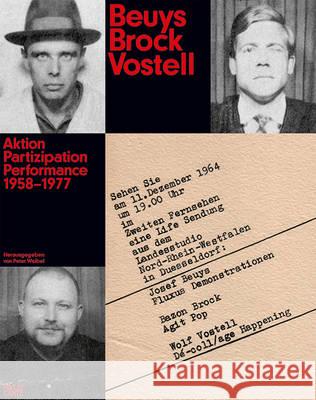Beuys Brock Vostell : Aktion. Partizipation. Performance. Katalog zur Ausstellung im ZKM, Museum für Neue Kunst, Karlsruhe, 2014 » książka
Beuys Brock Vostell : Aktion. Partizipation. Performance. Katalog zur Ausstellung im ZKM, Museum für Neue Kunst, Karlsruhe, 2014
ISBN-13: 9783775738644 / Niemiecki / Twarda / 2016 / 411 str.
Beuys Brock Vostell : Aktion. Partizipation. Performance. Katalog zur Ausstellung im ZKM, Museum für Neue Kunst, Karlsruhe, 2014
ISBN-13: 9783775738644 / Niemiecki / Twarda / 2016 / 411 str.
(netto: 250,56 VAT: 5%)
Najniższa cena z 30 dni: 261,26 zł
ok. 10-14 dni roboczych.
Darmowa dostawa!
Umfassender Materialien- und Quellenband mit Briefen, Fotos, Zeitdokumenten, Partituren und Manuskripten
"Umso besser können wir eine sinnvoll-schlagkräftige Publikation BBV (Beuys Brock Vostell) vorbereiten mit viel Text, ebenfalls Plakat. Lass uns etwas Zeit dafür." Brief von Wolf Vostell an Bazon Brock, 24.12.1964Erstmals werden die bedeutenden deutschen Aktionskünstler der Nachkriegsmoderne Joseph Beuys (1921-1986), Bazon Brock ( 1936) und Wolf Vostell (1932-1998), die in den 1960er-Jahren zusammen auftraten, in einer Publikation präsentiert. Neben inhaltlichen Parallelen ihrer Arbeiten, etwa der Auseinandersetzung mit dem Holocaust, zeigen sich Berührungspunkte im Vorgehen der befreundeten Künstler. Alle drei waren an der Erfindung der Lehre als Aufführungskunst beteiligt und rückten das Vermitteln, die Diskussion und die Demonstration ins Zentrum ihrer Arbeit. Die radikale Emanzipation des Individuums sowie die Reform der Gesellschaft bildeten ihr gemeinsames Ziel. Das Schaffen der Künstler wurde nicht nur wegweisend für die Entwicklung des erweiterten Werkbegriffs, sondern leistet einen fundamentalen Beitrag zur performativen Wende und für die partizipatorischen Konzepte in der Kunst des 21. Jahrhunderts.Ausstellung: ZKM Museum für Neue Kunst, Karlsruhe 24.5.-9.11.2014, gefördert von der Kunststiftung NRW For the first time, the prominent German artists Joseph Beuys (1921 - 1986), Bazon Brock (born 1936), and Wolf Vostell (1932 - 1998), who collaborated in the sixties, are being presented in a single publication. In addition to parallels in the content of their work, such as their examination of the Holocaust, the three friends shared certain interests in terms of their approach. All three were involved in developing teaching practices as a form of performance art and in shifting communication, discussion, and demonstrations to the heart of their work. The radical emancipation of the individual and social reform were also common goals. Not only groundbreaking for the de velopment of the expanded concept of art, their practices also made a fundamental contribution to the performative turn and the development of participatory concepts in twentieth century art.Exhibition: ZKM Museum für Neue Kunst, Karlsruhe 24.5. 9.11.2014, gefördert von der Kunststiftung NRW











